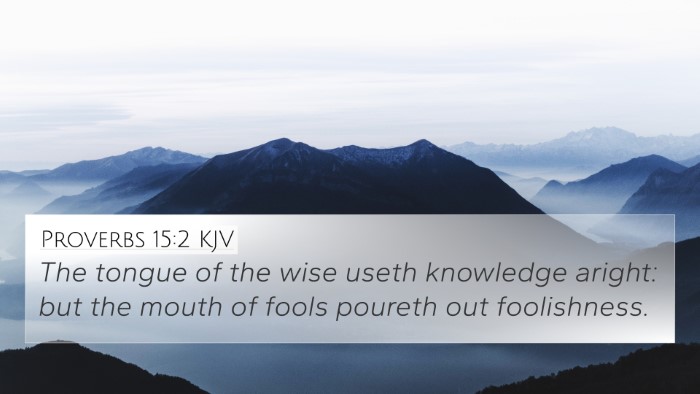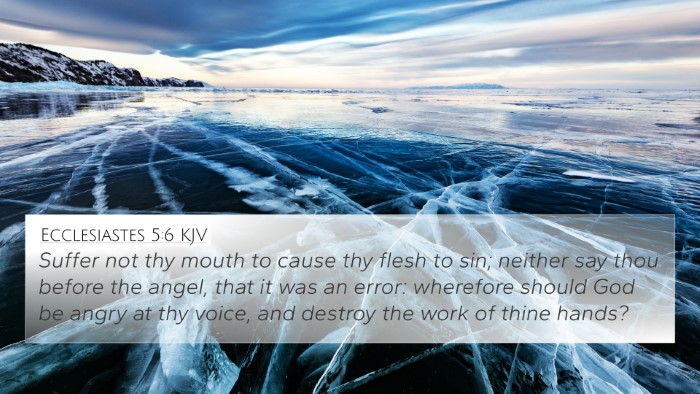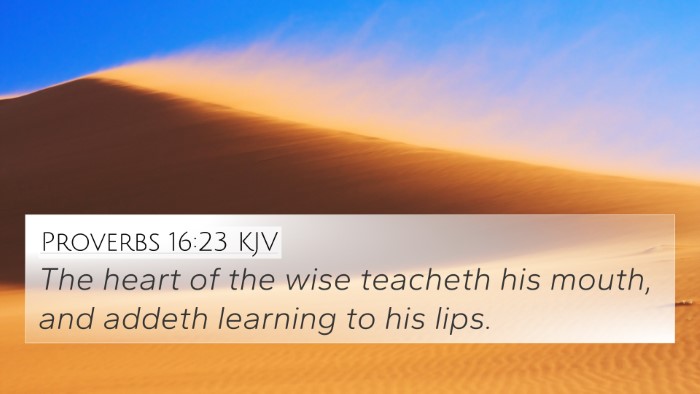Understanding Proverbs 15:28
Proverbs 15:28 states, "The heart of the righteous studieth to answer: but the mouth of the wicked poureth out evil things." This verse conveys the significance of thoughtful communication and contrasts the behaviors of the righteous and the wicked in discourse.
Overview of the Verse
In analyzing Proverbs 15:28, we find essential insights into the character of both the righteous and the wicked. The righteous person is depicted as someone who is deliberate and careful, pondering their responses before speaking, while the wicked are characterized as impulsive, allowing their speech to overflow with negativity and corruption.
Comparative Analysis
To further understand Proverbs 15:28, we can examine the following public domain commentaries:
- Matthew Henry: Henry points out that the righteous, through their heart and mind, seek to provide answers that are beneficial and constructive. He contrasts this with the wicked, who share harmful rhetoric.
- Albert Barnes: Barnes notes that careful consideration leads to wise responses, emphasizing the importance of wisdom and knowledge in communication. He suggests that the righteous reflect before they answer.
- Adam Clarke: Clarke interprets the verse as illustrating the difference in moral character between the righteous and the wicked, emphasizing that the wicked lack the depth of thought that characterizes the righteous.
Thematic Connections
This verse opens various themes in biblical literature, such as:
- Wisdom in Speech: The Book of James (James 1:19) emphasizes being quick to hear and slow to speak.
- Accountability for Words: Matthew 12:36 discusses how men will be judged by their words.
- The Nature of the Heart: Proverbs 4:23 highlights the importance of guarding one’s heart, as it is the source of life.
- Contrast of Righteousness and Wickedness: Matthew 7:16 speaks of recognizing people by their fruits, reflecting their character.
Cross-Referencing Biblical Thoughts
To gain a deeper understanding of the connections established in Proverbs 15:28, several cross-references can be utilized:
- James 1:19 - "Wherefore, my beloved brethren, let every man be swift to hear, slow to speak, slow to wrath."
- Matthew 12:36 - "But I say unto you, that every idle word that men shall speak, they shall give account thereof in the day of judgment."
- Proverbs 18:13 - "He that answereth a matter before he heareth it, it is folly and shame unto him."
- Proverbs 29:11 - "A fool uttereth all his mind: but a wise man keepeth it in till afterwards."
- Colossians 4:6 - "Let your speech be alway with grace, seasoned with salt, that ye may know how ye ought to answer every man."
- Proverbs 21:23 - "Whoso keepeth his mouth and his tongue keepeth his soul from troubles."
- Ephesians 4:29 - "Let no corrupt communication proceed out of your mouth, but that which is good to the use of edifying, that it may minister grace unto the hearers."
Practical Application
For readers seeking to apply this scripture practically, the following tools and methods can enhance understanding:
- Tools for Bible Cross-Referencing: Utilizing a Bible concordance can help identify themes and connections.
- Cross-Reference Bible Study: Engage in discussions that analyze how various passages interact with each other.
- Bible Reference Resources: Explore both Old and New Testament texts for thematic studies.
- Bible Chain References: Develop a systematic approach to study interconnected verses.
Conclusion
The insights provided through Proverbs 15:28 reveal the essential nature of thoughtfulness in communication, the consequences of our words, and the moral implications tied to our speech. By engaging with related verses, one can cultivate a deeper understanding of scriptural principles and their applications in everyday life.

















